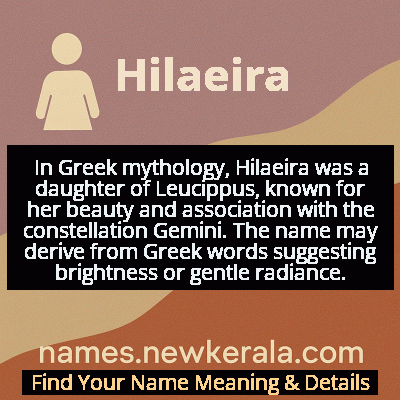Hilaeira Name Meaning & Details
Origin, Popularity, Numerology Analysis & Name Meaning of Hilaeira
Discover the origin, meaning, and cultural significance of the name HILAEIRA. Delve into its historical roots and explore the lasting impact it has had on communities and traditions.
Name
Hilaeira
Gender
Female
Origin
Greek
Lucky Number
9
Meaning of the Name - Hilaeira
In Greek mythology, Hilaeira was a daughter of Leucippus, known for her beauty and association with the constellation Gemini. The name may derive from Greek words suggesting brightness or gentle radiance.
Hilaeira - Complete Numerology Analysis
Your Numerology Number
Based on Pythagorean Numerology System
Ruling Planet
Mars
Positive Nature
Generous, passionate, energetic, and humanitarian.
Negative Traits
Impulsive, impatient, moody, and can be overly emotional.
Lucky Colours
Red, maroon, scarlet.
Lucky Days
Tuesday.
Lucky Stones
Red coral, garnet.
Harmony Numbers
1, 2, 3, 6.
Best Suited Professions
Military, sports, philanthropy, leadership roles.
What People Like About You
Courage, energy, leadership, generosity.
Famous People Named Hilaeira
Hilaeira of Greek Myth
Mythological Figure
One of the Leucippides sisters whose abduction by Castor and Pollux became a foundational Greek myth
Hilaeira (Literary Character)
Fictional Character
Featured in contemporary mythological retellings and classical studies
Hilaeira Papadopoulos
Classical Scholar
Academic research on women in Greek mythology and classical reception studies
Name Variations & International Equivalents
Click on blue names to explore their detailed meanings. Gray names with will be available soon.
Cultural & Historical Significance
Extended Personality Analysis
The name Hilaeira evokes a personality profile characterized by radiant energy and deep emotional intelligence. Those bearing this name often exhibit a natural luminosity that attracts others while maintaining an air of mystery and depth. They tend to be highly perceptive individuals who notice subtleties others might miss, with a particular sensitivity to beauty, harmony, and spiritual matters. Hilaeiras typically possess strong intuitive abilities and may be drawn to creative or healing professions where their empathetic nature can flourish. Despite their gentle appearance, they demonstrate remarkable resilience when faced with challenges, much like their mythological counterpart who navigated the dramatic transition from priestess to bride. Their personality often balances traditional values with progressive thinking, creating a unique synthesis of wisdom and innovation. Hilaeiras are frequently described as 'old souls' who carry ancient wisdom while remaining fully engaged with the modern world. They tend to form deep, meaningful relationships and value authenticity in all interactions. Their combination of grace under pressure and ability to find light in darkness makes them natural leaders in times of transition or crisis.
Modern Usage & Popularity
In contemporary naming practices, Hilaeira occupies a unique niche as a mythological name that is both deeply classical and refreshingly uncommon. While it has never ranked among popular baby names in any country, it experiences periodic revivals coinciding with renewed interest in Greek mythology through literature, film, and television. The name appeals particularly to parents seeking names that are feminine yet strong, melodic yet distinctive. Recent years have seen increased usage in Greece and among classical scholars worldwide, though it remains rare enough to guarantee uniqueness. Hilaeira fits well with current naming trends favoring mythological and ancient names, while its ending in '-a' aligns with popular feminine name patterns. The name's accessibility has improved with globalization and digital communication, though some parents still hesitate due to pronunciation uncertainties. Its usage is most common in educated, cosmopolitan circles where classical references are valued and understood. The name's rarity ensures that each Hilaeira stands out while carrying the weight of millennia of cultural history.
Symbolic & Spiritual Meanings
Hilaeira embodies rich symbolic meanings that transcend her mythological origins to represent universal human experiences. Primarily, she symbolizes radiance and illumination - not just physical light but the inner light of wisdom, beauty, and spiritual awareness. Her story represents the transformative journey from one state of being to another, making her a symbol of transition, growth, and the inevitable changes that shape human lives. The abduction myth positions her as a symbol of agency within constraint, reflecting how individuals navigate circumstances beyond their control while maintaining core identity. Hilaeira also symbolizes sisterhood and female bonds through her inseparable connection with Phoebe, representing the power of familial relationships to sustain individuals through life's challenges. As a priestess turned bride, she embodies the integration of spiritual devotion and earthly love, suggesting that sacred and profane aspects of life can coexist and enrich each other. Her celestial associations link her to moonlight and its symbolic meanings of intuition, cycles, and feminine power. Ultimately, Hilaeira represents the enduring human capacity to find meaning and beauty even in disruptive experiences, emerging transformed yet fundamentally intact.

